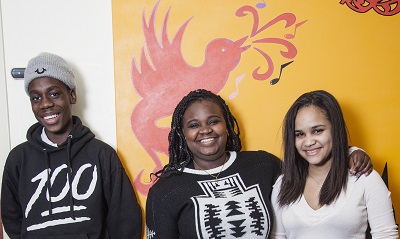Lena was just 17 when she came to Sanctuary for counseling. For years she’d witnessed her father abuse her mother – physically, verbally, emotionally and economically – and at times Lena herself was the target of his attacks.
Teens are deeply impacted by witnessing any sort of violence between their parents. It’s normal for teens to be focused on developing their identity, figuring out who they are, and asserting some sort of independence. When there is violence in the home, these normal developmental tasks are impacted and even sidetracked.
The way that we as individuals learn about life and how to act in life, and what behavior is appropriate, is through our family. We learn from watching our parents – how they take care of us, how they interact with each other, how they interact with the world. When the only examples you’ve been given are of violence, it’s really hard for teens to understand that an abusive and controlling relationship isn’t normal – that love doesn’t have to include violence.
Lena faced these struggles. She knew she did not want to be in an abusive relationship, but she was also convinced that any relationship she tried to enter with a boyfriend would turn abusive. She had a hard time believing that healthy relationships were real or possible, and struggled to identify any healthy relationships she knew of at all.
Of course, feelings like these are abetted by pressures from peers and messages from society. If you think back to when you were a teen, did you seek advice from adults or other teens? Most likely, you talked to your friends about your relationships, not your parents. Which is totally normal.
The thing is, teens don’t always have the most accurate or healthy information to pass along to their peers. In our world today, there exists so much violence and so many examples of unhealthy relationships that people start to believe these relationships are normal. Combine this with an abusive household, and the results can be disastrous for a teen who’s just trying to figure things out.
Teens in violent homes may be forced to act “parentified” – as an adult, instead of a teen, taking on the responsibility of protecting the abused parent and younger siblings while trying to keep the household running. Some teens will leave altogether and engaging in risk-taking behaviors: skipping school, substance use, and participating in gangs as a way of finding support. Needless to say, school often suffers and it’s nearly impossible to set goals for the future.
This post is Part 1 of a 2-part series about teens and domestic violence- read Part 2.
Andrea Yeriazarian has been working with kids and teens since she became a social worker 11 years ago. Andrea has spent 9 of those years with Sanctuary’s Children’s and Youth Services Program, and has been a leader in shaping the agency’s services for teens.
View all of our Domestic Violence Awareness Month blog series, and find out how you can speak up.
